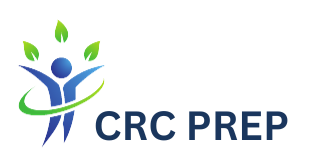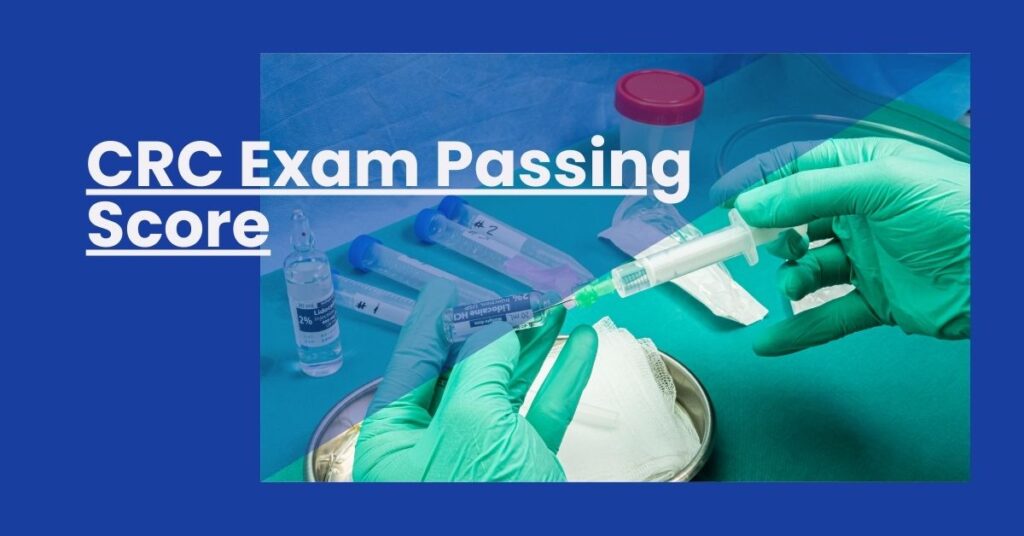A passing score on the CRC Exam is achieved by correctly answering at least 70 out of the 100 multiple-choice questions, which equates to a 70% success rate. If you’re aiming for certification in rehabilitation counseling, knowing this benchmark is key to preparation and success.
In this article, you’ll find:
- The structure of the CRC Exam and what topics it covers.
- Effective study strategies to help you exceed the passing score.
- Post-exam steps to take, whether you pass or fail.
Make your study count and approach the CRC Exam with the confidence of a well-prepared candidate.
- What is the CRC Exam?
- CRC Exam Format and Structure
- Defining a Passing Score on the CRC Exam
- How is the CRC Exam Scored?
- Preparing for Success: Study Strategies and Resources
- Exam Day Tips for a Higher Score
- What Happens After the CRC Exam?
- Common Misconceptions About the CRC Passing Score
- Retaking the CRC Exam: Understanding the Policies
- Long-Term Value of Passing the CRC Exam
- Conclusion: Setting Yourself Up for Success on the CRC Exam
What is the CRC Exam?
The Certified Rehabilitation Counselor (CRC) Exam represents a golden ticket for professionals eager to demonstrate their knowledge and dedication in the rehabilitation counseling field. This comprehensive examination tests your understanding of key concepts and practices that are integral to providing top-tier services in this empathetic career path.
Imagine the CRC Exam as a pivotal step on your journey toward enhancing life’s quality for individuals with disabilities. Through a series of thought-provoking questions, you’re assessed on a wealth of knowledge spanning twelve domains, crucial for successful rehabilitation counseling. Embracing topics as diverse as counseling theory, the psychology of disability, and vocational services, this exam reflects your capability to translate theory into practice—a skill that will undoubtedly make a difference in countless lives.
To sit for the CRC Exam, you’re typically required to have completed specific educational and experiential prerequisites. So, if you’ve been dedicating your educational pursuits and professional experiences towards making a meaningful impact in the rehabilitation community, the CRC Exam is your next significant milestone.
CRC Exam Format and Structure
At first glance, the framework of the CRC Exam may seem daunting. Yet, by dissecting its structure, you’ll be equipped to tackle each question with precision and confidence.
The exam unfolds in a multiple-choice format containing 175 questions, which you’re expected to complete within 3.5 hours. Each question rigorously examines your proficiency across various domains of rehabilitation counseling. With a blend of knowledge-based and situational questions, you can showcase not just what you know, but how you apply your knowledge in real-world scenarios.
These domains encompass everything from Human Growth and Development to Employment and Career Development. Get acquainted with them, and you’ll refine your ability to pinpoint your study focus, reinforcing your knowledge where it counts.
Defining a Passing Score on the CRC Exam
So, what is a passing score on the CRC exam? Simply put, a passing score is your indication that you possess the minimum competency required to practice rehabilitation counseling effectively. Think of it as the academic nod that says, “You’re ready to make a difference.”
As of the latest exam format, achieving a score of at least 500 out of 800 is your goalpost. This scaled score ensures consistency in difficulty across various exam forms. Thus, whether your exam features questions that lean toward tougher or easier, the passing score remains a reliable measure of competency.
Achieving or surpassing this score isn’t just about proving your knowledge—it’s about opening doors to professional opportunities and the satisfaction of reaching a career-defining milestone.
How is the CRC Exam Scored?
Curious about how your efforts on the CRC Exam turn into a score? The answer lies in the innovative scoring process used to maintain fairness and accuracy.
Though you’ll face 175 questions, be aware that only 150 of these contribute to your score. The remaining 25 are pretest questions, woven into the exam to evaluate their effectiveness for future exams.
Your score, therefore, isn’t as straightforward as the number of questions answered correctly. The CRC Exam utilizes a scaled scoring method, converting your raw score—the total number of questions you’ve answered correctly—into a scaled score through a technique known as equating. Equating accounts for minute differences in difficulty across various exam versions, ensuring that each candidate is held to the same standard of competence.
By the end, your scaled score will reflect your proficiency, allowing you to stand shoulder to shoulder with other professionals in the rehabilitation counseling field, irrespective of when or where they took the exam.
Preparing for Success: Study Strategies and Resources
Diving headfirst into the CRC Exam without a strategy is like navigating uncharted waters without a compass. That’s why having a robust study plan is like having a secret weapon.
Begin by acquainting yourself with the CRC Exam’s Content Outline. This outline delineates the twelve knowledge domains, guiding you toward subject areas that merit your attention. Furthermore, the varied resources provided by the Commission on Rehabilitation Counselor Certification, such as flashcards and practice exams, serve as your trusty allies.
To build a structured study regime, consider these steps:
- Evaluate Your Strengths and Weaknesses: Conduct an honest self-assessment to determine which domains you’re already strong in and which ones need bolstering.
- Create a Study Schedule: Allocate regular, focused study sessions, ensuring that no domain feels neglected.
- Utilize Practice Tests: These are invaluable for gauging your readiness and refining your test-taking strategies.
- Join Study Groups: Collaborate with peers to gain diverse perspectives and clarification on complex topics.
- Embrace Diverse Learning Materials: From textbooks to online forums, expanded knowledge sources can reinforce your understanding.
Remember, smart preparation transcends mere memorization—it’s about ingraining these concepts so that they become second nature, allowing you to apply them confidently in your professional endeavors.
Exam Day Tips for a Higher Score
The day you’ve been preparing for—the CRC Exam day—is finally before you. But even the most prepared can falter under pressure, which is why you should arm yourself with strategies that will keep you composed and ready to excel.
Here’s how to enhance your chances of attaining and exceeding a passing score:
- Arrive Early: Ensure you’re at the testing center with plenty of time to spare. This will help mitigate any last-minute stress and allow you to settle into the exam mindset.
- Eat and Drink Mindfully: A nutritious meal can fuel your brain, and staying hydrated keeps you alert. However, balance is key—excessive drinking might lead to unnecessary bathroom breaks.
- Dress Comfortably: Opt for layers to adjust easily to the room’s temperature, keeping your focus on the exam, not on your discomfort.
- Practice Deep Breathing: When you feel overwhelmed, take a few deep breaths to calm your nerves and re-center your focus.
As with any major professional hurdle, the role of a cool-headed approach on exam day cannot be understated. Your success hinges not just on what you know, but on how well you can demonstrate that knowledge under exam conditions.
For more detailed strategies, consider reviewing Exam Day Tips.
What Happens After the CRC Exam?
You’ve given it all you’ve got, and now, the waiting game begins. Right after the exam, you will receive a preliminary pass or fail status, but keep in mind that this result is not final.
Official results will be mailed to you within six weeks. If your score meets or surpasses the elusive “passing score on the CRC exam,” celebrations are in order! Not only have you shown mastery of the knowledge required, but you’ve also unlocked a new echelon in your professional journey. It’s more than a milestone—it’s a transformative certification that acknowledges your expertise and commitment to the field.
Should you find yourself needing another attempt, don’t be disheartened. Instead, use it as a learning experience, a stepping stone to understand where your preparation fell short. Taking this resilient approach can only make you stronger for the next round.
For more information about results and next steps, visit the official webpage on What Happens After the CRC Exam.
Common Misconceptions About the CRC Passing Score
There may be myths and misconceptions swirling around about how a passing score is determined on the CRC exam. Some might think it’s a fixed percentage that every test taker must achieve. Others mistakenly believe that the scaled scoring method works against them.
Here’s the reality: the scaled score adjusts for minor variance in difficulty across different versions of the exam, which means your score is a fair reflection of where you stand. Moreover, achieving the passing mark means you’ve demonstrated the competency required of a rehabilitation counselor, it’s not a comparison against your peers.
Understanding the true mechanics behind the CRC passing score can clear up anxieties and equip you with a clearer goal when preparing.
Retaking the CRC Exam: Understanding the Policies
If you come up short, remember that it’s not the end. Familiarize yourself with the retake policy; you can sit for the exam during the next available testing window, which is a reassurance that your dream is merely deferred, not denied.
There are certain limits, however. You’re allowed three attempts within a year from your initial application approval date. And there’s an enforced 90-day waiting period before retaking the exam. Plan your subsequent preparation efforts accordingly, remembering that each attempt is a chance to fortify your knowledge base further.
For more specifics on retake policies, you’ll find Retaking the CRC Exam helpful.
Long-Term Value of Passing the CRC Exam
Securing a passing score on the CRC exam is more than a professional requirement—it’s an investment in your future. Once you pass, you align with an elite cadre of professionals recognized for their expertise in the rehabilitation counseling field. This certification translates to broader career opportunities, a potential increase in earnings, and, possibly most important, the gratifying assurance that you can provide the highest standard of service to those in need.
In the quest to understand exactly what a passing score is on the CRC exam, keep sight of the longer horizon. Each hour of study is a step towards not just an impressive professional credential, but a lifetime of making impactful, positive differences.
Conclusion: Setting Yourself Up for Success on the CRC Exam
In conclusion, knowing the answer to “What is a passing score on the CRC exam?” is just the beginning. Your journey will challenge you to go beyond understanding the scoring itself to embracing a winning approach to preparation, mastering exam strategies, and looking ahead at the broader ramifications of your success.
Remember, each step of this process—studying, strategizing, learning from setbacks, and ultimately passing—shapes you into a more skilled and confident professional. Approach the CRC Exam with purpose and preparation, and let it serve as a stepping stone to a meaningful and rewarding career in rehabilitation counseling.
What is a passing score on the CRC exam? Learn the criteria to achieve certification in rehabilitation counseling. Details inside.

